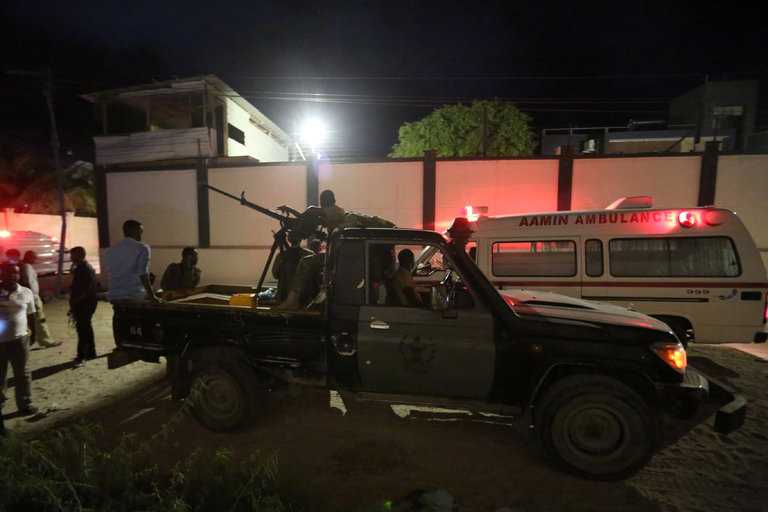
MOGADISHU, Somalia — An assault by militants in the Somali capital, Mogadishu, began Wednesday evening with a car bombing at the gates of a hotel popular with foreigners and continued with gunfire at a nearby restaurant.
At least 17 people were killed and dozens of others were taken hostage, according to local officials and the emergency services. Special forces rescued more than 50 hostages, according to the state news media.
The attack occurred less than a week after militants from the Shabab extremist group killed dozens of people — both soldiers and civilians, including children — when they stormed a military base in northeastern Somalia.
On their website, the Shabab took responsibility for the violence on Wednesday, which started at the Posh Hotel in downtown Mogadishu. After a car bomb exploded at the hotel’s gates, gunmen fanned out to the Pizza House restaurant.

Many people, including visitors from Ethiopia and Kenya, had been enjoying a night out.
“I saw several people lying on the ground,” said Yusuf Warsame, a freelance photojournalist who went to the scene. “I personally counted the dead bodies of six people, including a young woman.”
MOGADISHU, Somalia — An assault by militants in the Somali capital, Mogadishu, began Wednesday evening with a car bombing at the gates of a hotel popular with foreigners and continued with gunfire at a nearby restaurant.
At least 17 people were killed and dozens of others were taken hostage, according to local officials and the emergency services. Special forces rescued more than 50 hostages, according to the state news media.
The attack occurred less than a week after militants from the Shabab extremist group killed dozens of people — both soldiers and civilians, including children — when they stormed a military base in northeastern Somalia.
On their website, the Shabab took responsibility for the violence on Wednesday, which started at the Posh Hotel in downtown Mogadishu. After a car bomb exploded at the hotel’s gates, gunmen fanned out to the Pizza House restaurant.

Many people, including visitors from Ethiopia and Kenya, had been enjoying a night out.
“I saw several people lying on the ground,” said Yusuf Warsame, a freelance photojournalist who went to the scene. “I personally counted the dead bodies of six people, including a young woman.”
It was not known how many people were being held captive early Thursday, but the Shabab, who have links to Al Qaeda, are known for killing hostages, not holding them for ransom.
Newsletter Sign Up
Thank you for subscribing.
An error has occurred. Please try again later.
You are already subscribed to this email.
View all New York Times newsletters.
- See Sample
- Manage Email Preferences
- Not you?
- Privacy Policy
- Opt out or contact us anytime
The Shabab have been fighting the United Nations-backed government in Mogadishu for years, seeking to impose their strict interpretation of Islam. They have also been behind attacks in Uganda and Kenya, including the Westgate Mall siege in Nairobi in 2013. Recently, they have carried out a series of attacks in Kenya, killing dozens.
Although they have suffered defeats, including the deaths of leaders and loss of territory, the Shabab’s ability to inflict harm remains undiminished. Devastating attacks on hotels have been one of their trademarks.
Last Sunday, the United States military carried out a drone strike in southern Somalia against the Shabab, the first since President Trump relaxed some of the rules for preventing civilian casualties when the Pentagon carries out counterterrorism strikes in the country.
The strike, which the military said had targeted the command and logistics portion of a Shabab camp, came two and a half months after Mr. Trump cleared the way for offensive strikes in Somalia, a chaotic nation in the Horn of Africa, without a specific self-defense rationale.
We’re interested in your feedback on this page. Tell us what you think.



























